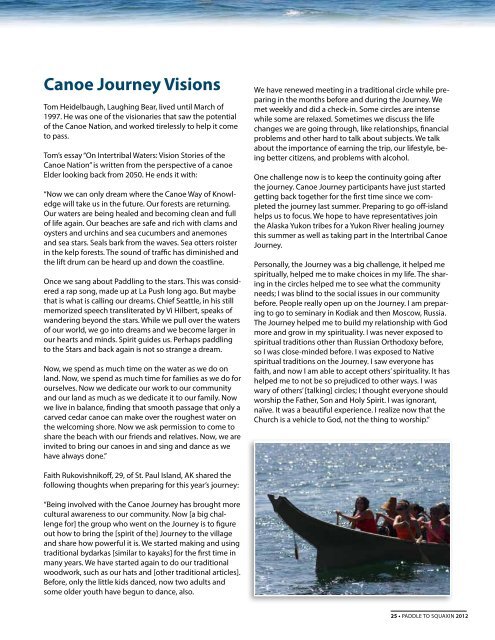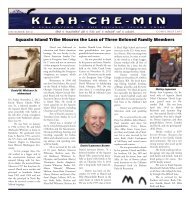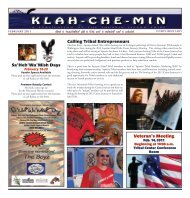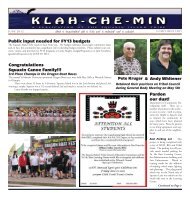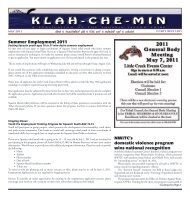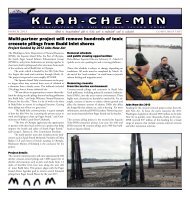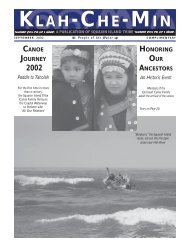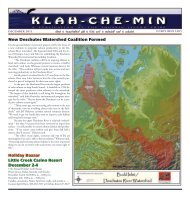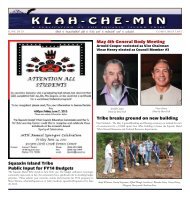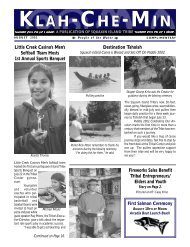Canoe Journey Guidebook - Squaxin Island Tribe
Canoe Journey Guidebook - Squaxin Island Tribe
Canoe Journey Guidebook - Squaxin Island Tribe
Create successful ePaper yourself
Turn your PDF publications into a flip-book with our unique Google optimized e-Paper software.
<strong>Canoe</strong> <strong>Journey</strong> Visions<br />
Tom Heidelbaugh, Laughing Bear, lived until March of<br />
1997. He was one of the visionaries that saw the potential<br />
of the <strong>Canoe</strong> Nation, and worked tirelessly to help it come<br />
to pass.<br />
Tom’s essay “On Intertribal Waters: Vision Stories of the<br />
<strong>Canoe</strong> Nation” is written from the perspective of a canoe<br />
Elder looking back from 2050. He ends it with:<br />
“Now we can only dream where the <strong>Canoe</strong> Way of Knowledge<br />
will take us in the future. Our forests are returning.<br />
Our waters are being healed and becoming clean and full<br />
of life again. Our beaches are safe and rich with clams and<br />
oysters and urchins and sea cucumbers and anemones<br />
and sea stars. Seals bark from the waves. Sea otters roister<br />
in the kelp forests. The sound of traffic has diminished and<br />
the lift drum can be heard up and down the coastline.<br />
Once we sang about Paddling to the stars. This was considered<br />
a rap song, made up at La Push long ago. But maybe<br />
that is what is calling our dreams. Chief Seattle, in his still<br />
memorized speech transliterated by Vi Hilbert, speaks of<br />
wandering beyond the stars. While we pull over the waters<br />
of our world, we go into dreams and we become larger in<br />
our hearts and minds. Spirit guides us. Perhaps paddling<br />
to the Stars and back again is not so strange a dream.<br />
Now, we spend as much time on the water as we do on<br />
land. Now, we spend as much time for families as we do for<br />
ourselves. Now we dedicate our work to our community<br />
and our land as much as we dedicate it to our family. Now<br />
we live in balance, finding that smooth passage that only a<br />
carved cedar canoe can make over the roughest water on<br />
the welcoming shore. Now we ask permission to come to<br />
share the beach with our friends and relatives. Now, we are<br />
invited to bring our canoes in and sing and dance as we<br />
have always done.”<br />
We have renewed meeting in a traditional circle while preparing<br />
in the months before and during the <strong>Journey</strong>. We<br />
met weekly and did a check-in. Some circles are intense<br />
while some are relaxed. Sometimes we discuss the life<br />
changes we are going through, like relationships, financial<br />
problems and other hard to talk about subjects. We talk<br />
about the importance of earning the trip, our lifestyle, being<br />
better citizens, and problems with alcohol.<br />
One challenge now is to keep the continuity going after<br />
the journey. <strong>Canoe</strong> <strong>Journey</strong> participants have just started<br />
getting back together for the first time since we completed<br />
the journey last summer. Preparing to go off-island<br />
helps us to focus. We hope to have representatives join<br />
the Alaska Yukon tribes for a Yukon River healing journey<br />
this summer as well as taking part in the Intertribal <strong>Canoe</strong><br />
<strong>Journey</strong>.<br />
Personally, the <strong>Journey</strong> was a big challenge, it helped me<br />
spiritually, helped me to make choices in my life. The sharing<br />
in the circles helped me to see what the community<br />
needs; I was blind to the social issues in our community<br />
before. People really open up on the <strong>Journey</strong>. I am preparing<br />
to go to seminary in Kodiak and then Moscow, Russia.<br />
The <strong>Journey</strong> helped me to build my relationship with God<br />
more and grow in my spirituality. I was never exposed to<br />
spiritual traditions other than Russian Orthodoxy before,<br />
so I was close-minded before. I was exposed to Native<br />
spiritual traditions on the <strong>Journey</strong>. I saw everyone has<br />
faith, and now I am able to accept others’ spirituality. It has<br />
helped me to not be so prejudiced to other ways. I was<br />
wary of others’ [talking] circles; I thought everyone should<br />
worship the Father, Son and Holy Spirit. I was ignorant,<br />
naïve. It was a beautiful experience. I realize now that the<br />
Church is a vehicle to God, not the thing to worship.”<br />
Faith Rukovishnikoff, 29, of St. Paul <strong>Island</strong>, AK shared the<br />
following thoughts when preparing for this year’s journey:<br />
“Being involved with the <strong>Canoe</strong> <strong>Journey</strong> has brought more<br />
cultural awareness to our community. Now [a big challenge<br />
for] the group who went on the <strong>Journey</strong> is to figure<br />
out how to bring the [spirit of the] <strong>Journey</strong> to the village<br />
and share how powerful it is. We started making and using<br />
traditional bydarkas [similar to kayaks] for the first time in<br />
many years. We have started again to do our traditional<br />
woodwork, such as our hats and [other traditional articles].<br />
Before, only the little kids danced, now two adults and<br />
some older youth have begun to dance, also.<br />
25 • paddle to squaxin 2012


